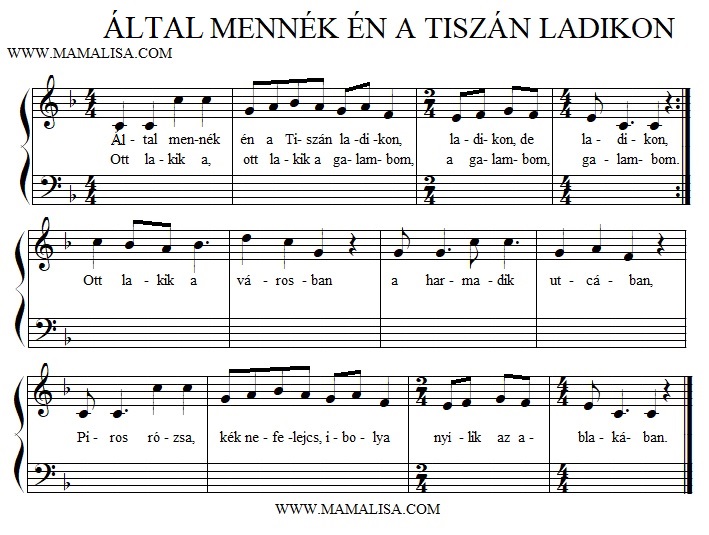Által mennék én a Tiszán ladikon
Által mennék én a Tiszán ladikon
I'd Like to Cross the Tisza by Boat
Folk Song
Folk Song
(Hungarian)
(English)
Által mennék én a Tiszán ladikon,
Ladikon, de ladikon,
Ott lakik a, ott lakik a galambom,
Ott lakik a galambom.
Ott lakik a városban,
A harmadik utcában,
Piros rózsa, kék nefelejcs,
Ibolya nyílik az ablakában.
Ott lakik a városban,
A harmadik utcában,
Piros rózsa, kék nefelejcs,
Ibolya nyílik az ablakában.
Által mennék én a Tiszán nem merek,
Nem merek, de nem merek.
Attól félek, hogy a Tiszába esek,
Hogy a Tiszába esek.
Lovam hátán seje-haj,
Félre fordult a nyereg,
A Tiszának habjai közt elveszek,
A babámé nem leszek.
Lovam hátán seje-haj,
Félre fordult a nyereg,
A Tiszának habjai közt elveszek,
A babámé nem leszek.
I'd like to cross the Tisza* by boat**
By boat, only by boat.
My dove lives there, lives there,
My dove lives there.
She lives in the town,
On the third street,
Red roses, blue forget-me-nots, violets
Are growing in her window.
She lives in the town,
On the third street,
Red roses, blue forget-me-nots, violets
Are growing in her window.
I would cross the Tisza, I don't dare,
I don't dare, but I don't dare.
I am afraid of falling into the Tisza,
Falling into the Tisza.
From the back of my horse, alas
The saddle turned aside.
I am getting lost amid
The foam on the Tisza
My baby will not have me.
On the back of my horse, alas***
The saddle turned aside.
I am getting lost amid
The foam on the Tisza
My baby will not have me.
Notes
Tinker Jack wrote…
*Tisza is the second largest river in Hungary. The Danube is the first.
**Actually, 'ladik' is something like a fishing boat [a punt]. I think, it is not exactly the same as 'boat'. 'De' meaning 'but' is quite difficult to translate here. It seems that this contrast-conjunction wants to express the speaker's determination.
***"'Seje-haj' is an onomatopoetic expression with a connotation I cannot really explain. Here, it is something pejorative. In other versions it could also express joy and happiness. It is true that the word 'haj' means 'hair' but here it does not belong to the horse. 'Seje' does not mean anything, to my knowledge". -Tinker Jack


Thanks!
Thanks!
Thanks and Acknowledgements
Many thanks to Tinker Jack for translating this song and providing the notes.


























